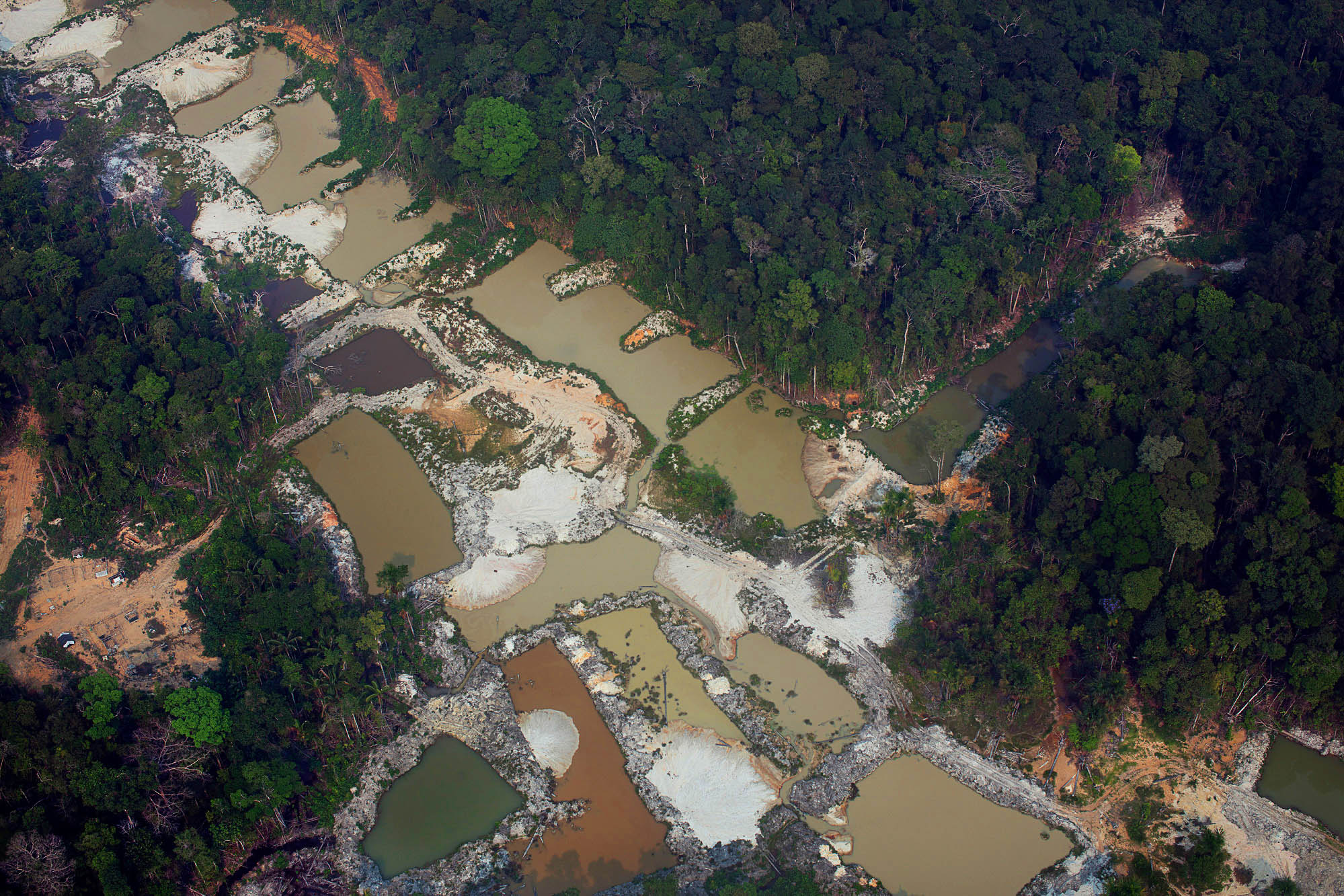The energy transition paradigm imposed by corporations promotes the extraction of minerals for constructing technologies that replace fossil fuels. While this approach advocates for "clean" energy, in practice, it exacerbates the unsustainable degradation of nature. As a financial hub for global mining, Canada stands out as a key player in advancing industrial mining in the Amazon. To avoid reaching the point of no return, it is essential to promote mining-free territories, rethink our political strategies, and redefine our relationship with Nature.
Despite the evident limitations of planet Earth, the persistent extractivist development model has not been accompanied by urgent and necessary structural political transformations. The current energy transition model driven by corporations has maintained global consumption patterns without addressing the predatory nature of human interaction with Nature. This dynamic has fostered the rise of mining, self-proclaimed as the leading industry of the ‘clean’ energy transition.
Given its role as a well-known financial and decision-making hub for global mining, Canada emerges as a key player in regulating transnational corporations that violate human and environmental rights. This is especially critical in ecologically sensitive areas like the Amazon rainforest, which holds strategic importance from a climate perspective. Geopolitical analysis must also consider that efforts for the energy transition are not evenly distributed across the planet: while mineral extraction occurs in Latin America, Africa, and Asia, the highest levels of energy and goods consumption are recorded in the United States and Europe.
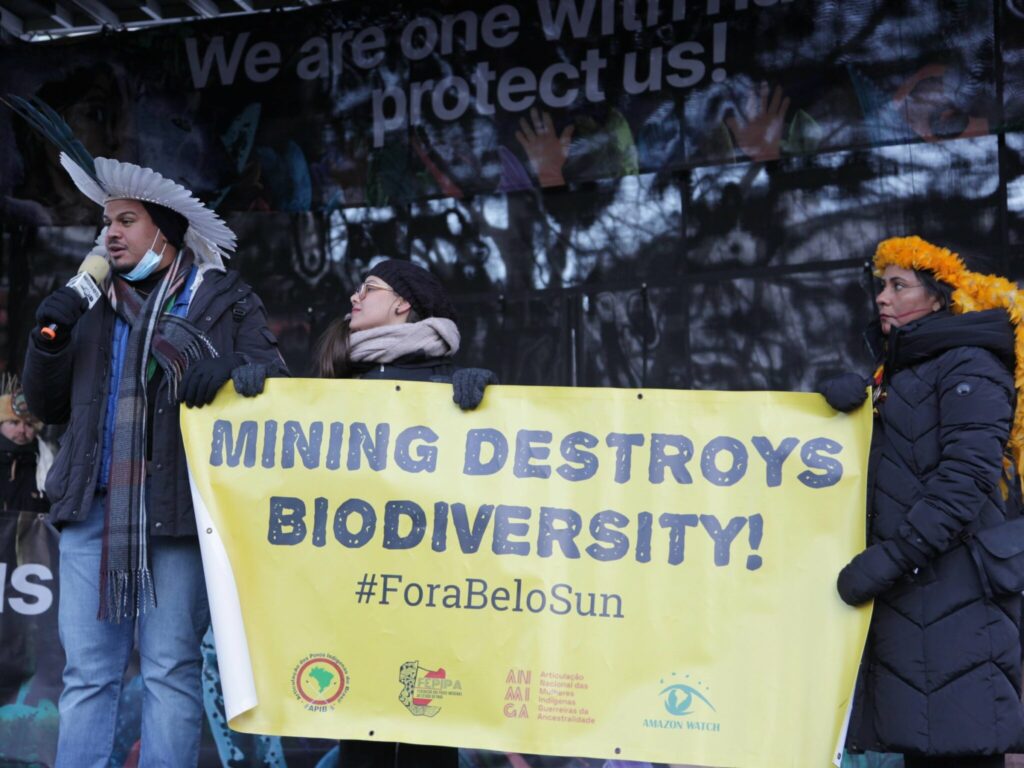
Mining dependency in the energy transition
Most specialized studies project that, by 2050, mineral extraction will multiply fivefold to meet the demand for renewable energies, especially for so-called “critical minerals”. It’s important to note that this definition is not purely technical, but fundamentally political. This is evident in different classifications: which minerals are considered critical varies by country, based on their national interests.
Under Jair Bolsonaro’s presidency, Brazil introduced another category: ‘strategic minerals.’ Through this terminological maneuver, the far-right government has broadened the scope of energy transition policies to influence which mining projects would be prioritized by the Brazilian state, both in terms of finances and environmental licenses. This new definition includes minerals not even listed in other global “critical minerals” lists, such as gold. Furthermore, it promotes extractive projects encroaching upon the Amazon rainforest, endangering a vital regional ecosystem crucial for global climate balance.
The contradiction is evident: “renewable” energy generation depends on the extraction of non-renewable resources, which also currently lack technology for effective recycling.
“Renewable” energy generation depends on the extraction of non-renewable resources, which also currently lack technology for effective recycling.
The paradox appears when, in order to meet global demand for decarbonization and a shift in the energy matrix, we should rely on so-called “clean energies”. In theory, these would have minimal environmental impact because they originate from renewable sources with low environmental impact. However, the problem lies in the fact that their manufacture requires non-renewable mineral resources—finite resources that also deplete over time. The contradiction is evident: “renewable” energy generation depends on the extraction of non-renewable resources, which also currently lack technology for effective recycling.
Another issue is the labeling of energy as “clean”. This term conceals the severe socio-environmental damage caused by mining in the Amazon: forced displacements, destruction of traditional ways of life, and environmental devastation. These environmental liabilities are omitted so that a specific project fits the clean energy definition. This is the case with hydroelectric dams like Belo Monte in Volta Grande do Xingu. To complicate matters further, it is often overlooked that so-called “renewable energies” require an even greater variety of minerals than conventional energy sources.
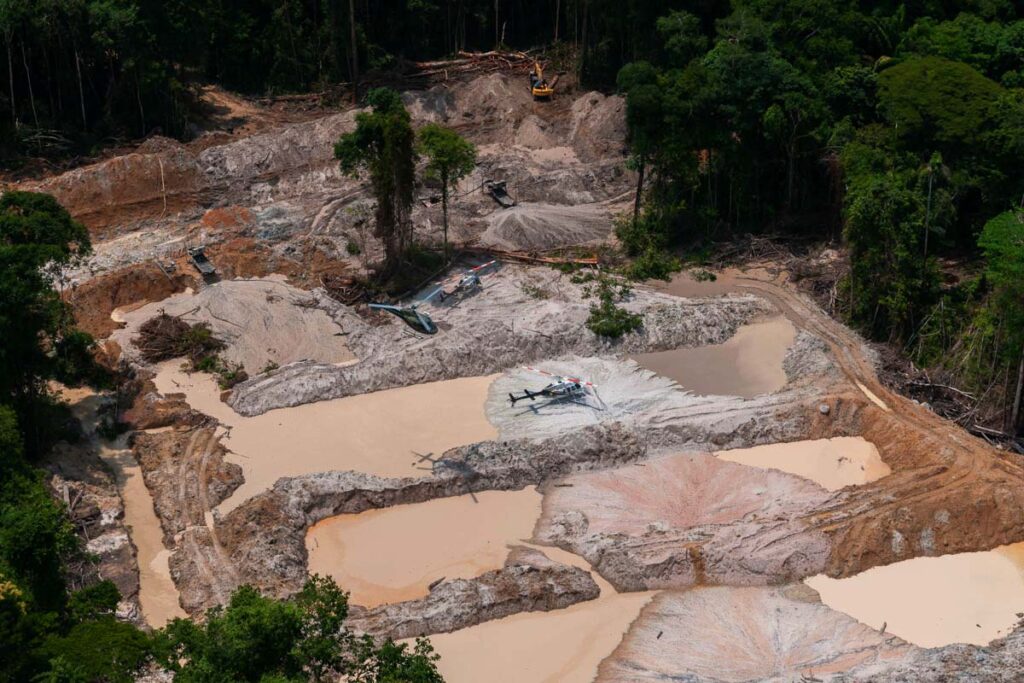
The imperial way of life, non-consensus, and sacrifice zones
While Europe consumes three times more resources than Asia and four times more than Africa, an individual born in the United States consumes more than the average European. This statistic indicates that the global effort towards energy transition only sustains Northern Global consumption at the expense of the exploitation and dispossession of lands in the Global South. Consequently, if we do not change the consumption patterns and imperial way of life in the Global North, we will end up needing far more resources than Earth has available. Let it be clear: there are not enough mineral reserves to meet that demand. Thus, environmental degradation will continue to worsen and disproportionately affect populations in the Global South.
This effort to limit ecological transition solely to its energy dimension has been termed “energy colonialism” because it has been reduced to the digitization and electrification of consumption. This non-consensual “solution” represents the new consensus of the capitalist model: the Decarbonization Consensus. Advocates for a more comprehensive and multifaceted approach to ecological transition, one that encompasses more than just the energy dimension, have been championed by the global environmental movement. The same proposal is put forth by Indigenous peoples and traditional communities whose territories are condemned as sacrifice zones by mining companies.
It is crucial to discuss and question the expansion of mining as a response to the climate crisis and as a proposed form of “sustainable development”, given the sector’s history of conflicts, violence, and environmental degradation.
It is crucial to discuss and question the expansion of mining as a response to the climate crisis and as a proposed form of “sustainable development”
The dispossession of communities and environmental devastation are clearly visible in the exponential advance of extractivism in the Amazon rainforest. Brazilian Amazonia currently encompasses approximately 90 million hectares designated for mineral applications, with 2.6 million hectares already authorized for mining by the National Mining Agency (ANM). Between 2005 and 2015, mining was responsible for 9% of the total deforestation in the entire rainforest, and it contributed at least 10% of global Greenhouse Gas emissions, contradicting decarbonization efforts.
In this context, it is crucial to discuss and question the expansion of mining as a response to the climate crisis and as a proposed form of “sustainable development”, given the sector’s history of conflicts, violence, and environmental degradation—from the installation of infrastructure to mineral transportation. Therefore, seeking solutions must not exacerbate existing problems, especially concerning an industry like mining that is responsible for socio-environmental crimes, dam collapses, groundwater contamination, and alterations to river courses. Undoubtedly, mining has put the Amazon, its rivers, and its communities at risk.
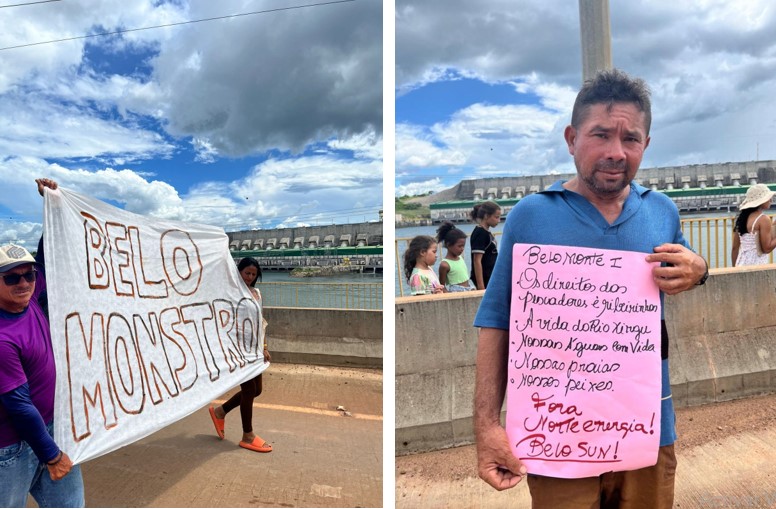
Canada: the hub of global mining
In recent decades, Canada has become the global financial center for the mining sector. The Toronto Stock Exchange (TSX) and the TSX Venture Exchange (TSXV) are the main trading platforms for mining and exploration companies, hosting over 1,170 issuers in 2021, accounting for 42% of global listings. Currently, Canadian companies are responsible for between 50% and 70% of mining activity in Latin America. Additionally, Canada is home to nearly half of the world’s publicly traded mining companies, many of which have faced numerous allegations of human rights abuses and environmental damage.
Canada’s foreign policy of “economic diplomacy” aims to facilitate global dominance of its mining firms through political support and prioritization of corporate interests. This approach creates clear tensions between Canada’s national objectives and its international obligations regarding human rights and the environment. The problem is compounded by Canada having developed several Action Plans to promote and protect the interests of Canadian companies operating abroad, while there is no binding national or international legislation requiring companies to respect human rights and the environment overseas.
Given the increasing demand for “critical minerals” for the energy transition led by corporations, it is crucial to pressure the Canadian government to regulate, supervise, and control the actions of its companies in the Amazon region.
Given the increasing demand for “critical minerals”, it is crucial to pressure the Canadian government to regulate, supervise, and control the actions of its companies in the Amazon region.
The connections between Canada’s economic diplomacy and the extractive sector have also encountered tensions in regional jurisprudence. Over the past three years, hearings and reports from the Inter-American Commission on Human Rights (IACHR) have focused on the actions of Canadian mining companies in Latin America. The IACHR directly imposes on governments the obligation to consult and obtain consent. As a member of the Organization of American States (OAS), Canada is obliged to align its legislation with the Commission’s decisions, including respecting indigenous self-determination and obtaining Free, Prior, and Informed Consent (FPIC) before granting concessions to exploit resources in their territories.
However, a study conducted by Amazon Watch, the Inter-American Association for Environmental Defense (AIDA), and more than 50 organizations revealed that out of 37 Canadian projects in Latin America, at least 26 lack Free, Prior, and Informed Consent. The study concluded that there is a pattern of human rights violations and environmental destruction by Canadian companies that is being exported to our region. Given the increasing demand for “critical minerals” for the energy transition led by corporations, it is crucial to pressure the Canadian government to regulate, supervise, and control the actions of its companies in the Amazon region.
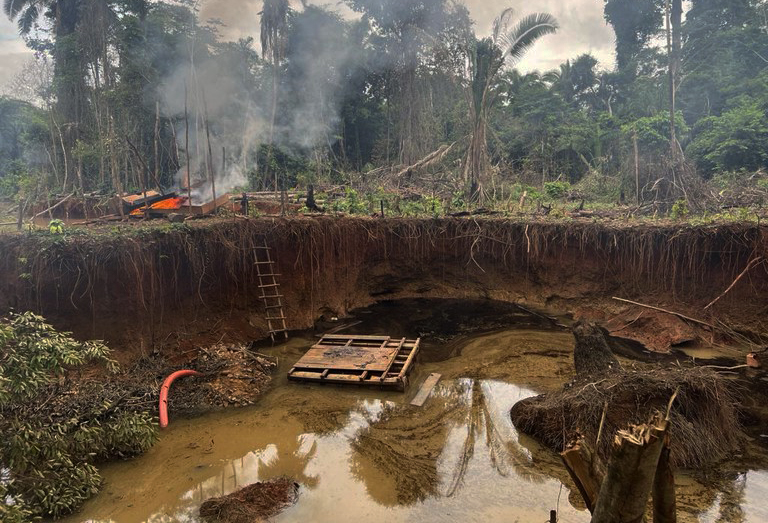
A planetary security strategy and colonial reparation
The Canadian government is a key actor that must be internationally pressured. On one hand, it needs to regulate and restrict the operations of its mining corporations. On the other hand, it must promote practices that respect the ecological integrity of territories and acknowledge how extractive companies violate human rights. It is time to reinforce that its shared but differentiated climate responsibility as a Northern Global country should supersede the extractivist colonial interests of its corporations. This way, we can move towards a transition that respects and preserves biodiversity, and reduces dependence on mining activity.
To achieve meaningful change, it is essential to limit mining operations in the Amazon and promote public participation. Specific territorial policies are needed to regulate mining, promote local economies, and ensure prior, free, and informed consultation. In this regard, the concept of mining-free territories emerges as an alternative from Global South peoples to defend common goods from mining threats and propose post-extractive socio-economic alternatives. In this context, judicial rulings are legitimized by popular support to block the advancement of extractive activities on territories.
The proposal for mining-free territories therefore defends common goods threatened by extractivism and proposes socio-economic alternatives to overcome dependence.
The proposal for mining-free territories therefore defends common goods threatened by extractivism and proposes socio-economic alternatives.
Designating the Amazon region as a mining-free territory would signify both a practice of colonial reparation for the region and its peoples, and a preventive measure for planetary security. The Amazon rainforest plays a crucial role in regulating the water cycle, regional rainfall, and hence, global climate. Meanwhile, mining is incompatible with protecting rivers and aquifers as it consumes large amounts of water crucial for biodiversity and agroecology. The proposal for mining-free territories therefore defends common goods threatened by extractivism and proposes socio-economic alternatives to overcome dependence.
As a result, it is a priority for authorities in Amazonian countries to pressure the Canadian government, while ensuring collective spaces to rethink our relationship with the land. We must promote an energy transition that respects socio-biodiversity, addresses rights violations, and promotes ecological preservation and restoration. We cannot accept a transition driven by companies prioritizing profit over life. How can mining be presented as a solution to the climate emergency when it is an activity that destroys the land and depletes existing reserves? We cannot repeat the cycle of violence and destruction from fossil fuels with another industry painted green.
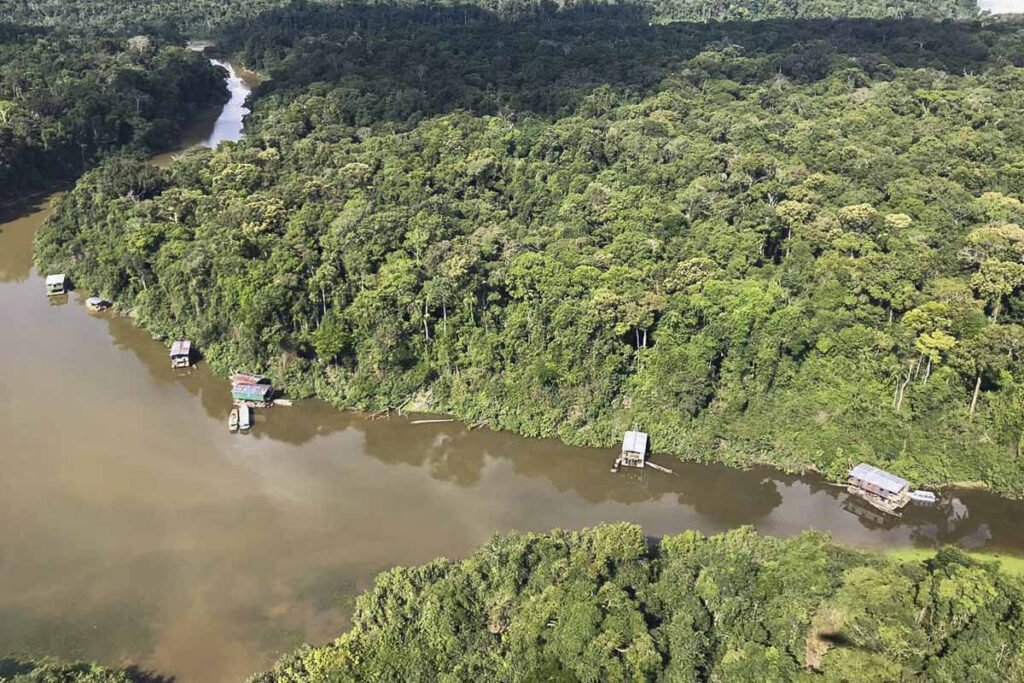
The Amazon as a mining-free territory
The connection between energy transition, mining, and political challenges is evident. Therefore, within the framework of the 11th Pan-Amazonian Social Forum (FOSPA), social movements, environmentalists, Indigenous peoples, peasants, and Afro-descendant communities have dedicated significant time to discussing alternatives to development and the extractivist model imposed by the market and capital accumulation. In practice, the so-called “energy transition,” focused solely on carbon emissions, has led to an increased dependence on minerals, severely affecting the Amazon.
A contradiction is revealed in the energy transition, as renewable energy generation depends on non-renewable mineral resources. The expansion of this industry and its connection to the consumption patterns of the Global North threaten essential areas for climate stability, such as the Amazon. The concept of “energy colonialism” underscores the need for a broader approach to the transition, considering territorial, social, and environmental dimensions, rather than merely focusing on electrification or digitalization of consumption.
Declaring the Amazon as a mining-free territory and off-limits to extractive industries signifies colonial reparations and a precaution for global security given its role in climate regulation. A transformative change in our relationship with nature is necessary. We must promote post-extractive economic alternatives and appropriate policies that prioritize popular participation and the preservation of common goods. Pressuring Canada would be an effective strategy to control and limit mining companies, prioritizing a more territorial and equitable approach to the energy transition. We cannot repeat the same cycle of violence and planetary destruction in the Amazon. It is imperative to transcend the colonial extractivist development paradigm and prioritize life over economic interests.

Gabriela Sarmet is an advisor for Amazon Watch in Brazil, coordinator of the Decolonial Centre (DCC), and holds a Master's degree in Violence, Conflict, and Development from SOAS. Additionally, she researches land-related conflicts and the connections between governments and extractive sectors in the Amazon and the Atlantic Forest.
